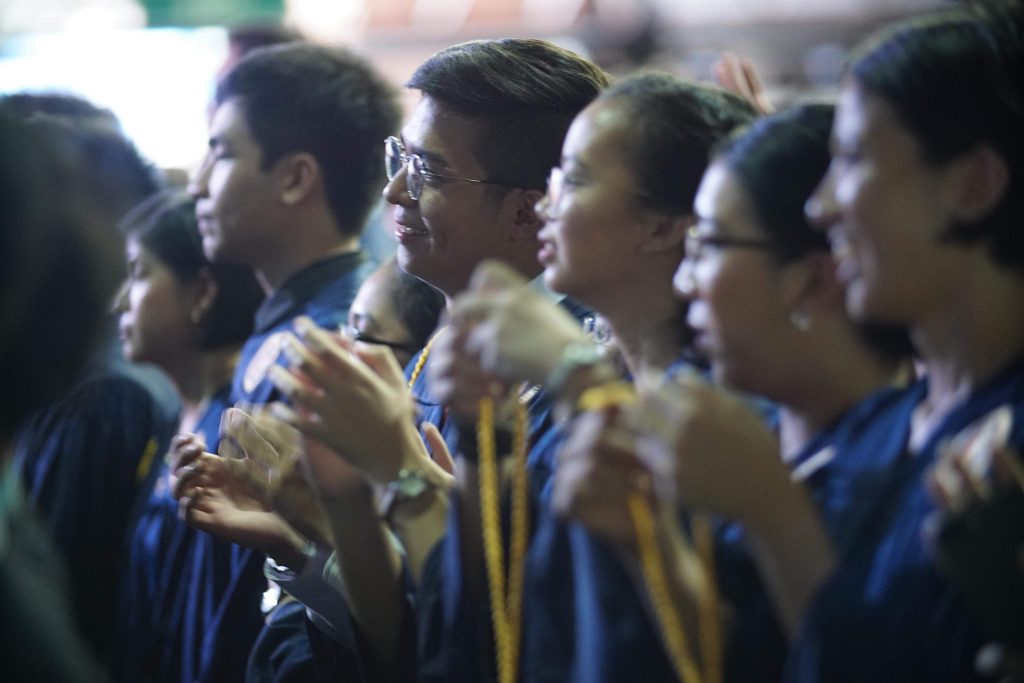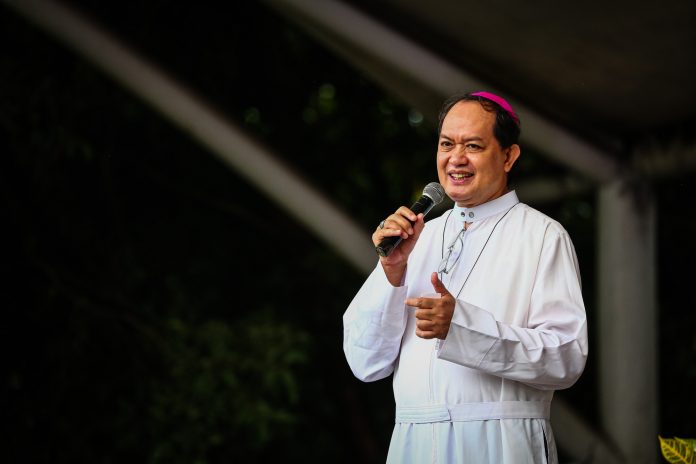Dear colleagues in the academic community of the Ateneo, I hope you don’t mind that I address myself to the batch of graduates for this year 2020.
Dear graduates, I am sure there has never been a graduation like yours in the whole history of the Ateneo. This must be the first time in history that the university is holding a virtual graduation like this, by force of our present circumstances.
The COVID-19 pandemic has been a humiliating experience for all humankind. It has made us realize how vulnerable we really are, in spite of all the scientific and technological advances that we have achieved in the past century. We’re not even talking about an asteroid colliding with the planet earth. We’re just dealing with one microscopic viral mutation that is enough to put all of us in a defensive mode and force us to hide like rats in our homes.
We were aware of the concept of quarantine for the sick, but never in our wildest dreams did we think that there would ever be a time when whole populations would need to be quarantined, as a desperate measure to stem the tide of a pandemic.
Nations around the world, including global powers, have called for lockdowns, paralyzing transportation, commerce and trade, causing business bankruptcy, massive unemployment, and the consequent the collapse of global and national economies. Suddenly, we all find ourselves in a state of uncertainty about the future.
I never thought that the Biblical narrative of a tenth plague, about hapless Hebrew slaves waiting for the passing angel of death would one day become real. And we’re not just talking about one night of passover; we’re talking about practically more than a whole year of waiting, of desperately trying to protect the vulnerable ones among us, hoping against hope that we can finally find the cure and the vaccine that will protect us from this dreadful disease. As of this writing, more than 32 million people around the world have been infected, and around a million of them have died.
Will we ever be able to get back to normal, to the way we lived our lives before this pandemic? I do not mean to be pessimistic, but I dare say prophetically that humankind will look back to 2020 as the year when the world got infected by a literal virus, experienced a system breakdown, and had to be put on a reset mode.
There is a song that became popular in my younger years that suddenly makes sense to me now. It says, “Hey Jude, don’t make it bad, take a sad song and make it better.” It is what we are being called to do now—not to go back to our old ways, but to make things better. We can turn this crisis into an opportunity, only if we have the humility to admit our foolishness, to change our wasteful, abusive and egotistic ways of dealing with our environment and with one another. Unless we get to reconfigure our economic and political systems in ways that are more mindful of the common good and the good of the planet earth, we cannot turn this breakdown into a breakthrough. It is ok to let go of old habits. As the song also says, “Don’t you know that it’s a fool who plays it cool by making the world a little colder.” No, we can make things better.

Among the many great mentors that I had in the Ateneo, there is one who still stands out in my consciousness, forty-two years later: Father Roque Ferriols. He was the one who taught me to keep asking the question, SINO AKO? ANO ANG LAYUNIN KO SA BUHAY? In my whole college life, I never listened to a lecture as intently as I listened to Father Ferriols. I remember how he opened his course in Pilosopiya ng Tao with the Filipino saying, “Madali ang maging tao, ngunit mahirap ang magpakatao.” Then he asked, “Ano ang kahulugan ng MAGPAKATAO?”
Si Father Ferriols and nagmulat sa akin tungkol sa tunay na hangarin ng edukasyon, ang MAGPAKATAO. Tandang-tanda ko pa nang tanungin niya kami, “E ano kung makapagtapos ka ng kolehiyo sa Ateneo? E ano kung sumikat ka, yumaman, o maging makapangyarihan sa lipunan? Ano ang kinalaman ng lahat ng ito sa tanong na SINO AKO? at ANO ANG LAYUNIN KO SA BUHAY?”
I know that for most people who aspire for college education, it is taken for granted that the objective is to develop our multiple human INTELLIGENCES and their application in the various careers and fields of human endeavor. As members of the human species we distinguish ourselves from the rest of our fellow creatures as intelligent beings, hence we refer to ourselves as “HOMO SAPIENS,” TAONG NAG-IISIP.
We think of our capacity to develop our rational intelligence as our most significant advantage over all other species in the course of evolution, that it is what makes us superior to all other creatures, including the prehistoric dinosaurs that got wiped out by a climate change.
But have you ever thought of the posibility that the very thing we consider as our strength could also be our weakness? Is it not the same intelligence that enables us to monopolize, to control, to manipulate, to dominate, to systematize cruelty, exploitation and oppression, violence and murder? The Israeli historian and public intellectual, Yuval Harari, published a widely acclaimed book entitled HOMO SAPIENS. He calls HOMO SAPIENS the most dangerous and most destructive species that ever lived on planet earth.
The other teacher who also had a profound influence in my formative years in the Ateneo was the American Jesuit, Father Joseph Galdon, whom we called Father Bob Hope. Yes, he was a splitting mage of the famous comedian, Bob Hope. I remember learning two important Greek concepts from Father Galdon in my subject in Classical Greek Literature: HUBRIS and NEMESIS. Roughly, their equivalent terms in English would be ARROGANCE and DOWNFALL.
I also learned how these two terms were related to each other. In Greek mythology, HUBRIS refers to the excessive pride that supposedly offends the gods and is the common cause for human downfall. NEMESIS, on the other hand, stands for a mythological deity—the god of retribution, the one who is ready to strike down those who are afflicted with HUBRIS.
In the Bible, we also hear about the inter-relatedness of hubris and nemesis, such as in Proverbs 16:18 where we read, “Pride goes before destruction, and arrogance before a fall.”
Hubris is the most common pitfall of human intelligence. It makes you understand why God had to warn Adam and Eve about the toxicity of the Tree of Knowledge of good and evil. It is not knowledge itself that is poisonous but the power that it brings. It is like the ring in Tolkien’s Lord of the Rings; anyone who wears it becomes delusional. Ironically, it is when we become excessively proud that we actually turn stupid and find ourselves on the path of self-destruction.
Today I suggest that you take time to read Psalm 90 and take its reminder seriously. It says, “You turn us back to dust, and say, ‘Return, o mortal!’ A thousand years in your eyes are merely a day gone by, like a watch in the night. You sweep them away like a dream; in the morning they spring up like grass, but by evening they wither and fade … our life is over like a sigh. Seventy is the sum of our years, or eighty, if we are strong; Most of these are fruitless toil; they pass quickly, and we are gone…. Teach us to number our days aright, so that we may gain wisdom of heart.”
I think the Homo Sapiens survived and dominated the world after the dinosaurs, not because of our big brains but because of our big hearts, our capacity to express care, solidarity with and compassion for each other, our capacity to love, to build family, community and a humane society. This is what makes us truly strong.
The notorious theologian Matthew Fox tells us that before original sin there was original blessing. We were already God’s image and likeness before we were seduced into aspiring to be Godlike in the wrong way. Our true instinct is not to kill or destroy but to be ready to suffer and die for each other and to offer our lives as an ultimate sacrifice for a purpose greater than ourselves. It is never too late to return to God’s original design—a species that should identify itself as HOMO AMANS (The Loving Humankind), a far more advanced species than HOMO SAPIENS. HOMO AMANS follows a more sublime instinct: not survival of the fittest, but care for the weakest.
Father Ferriols also introduced us to the Great Jesuit Philiosopher Pierre Teilhard de Chardin, who calls the highest form of human evolution a CHRISTOGENESIS. For Teilhard, the person of Christ represents the convergent focus of cosmic evolution: the Incarnate God, the new Adam, the HOMO DEUS, the new humanity that reflects divinity. It has been more than 2020 years now since God offered him to us as a new template for humanity.
Congratulations once again, Ateneo Graduates of Batch 2020. I hope you are as excited as I am about the new world that God is already designing in our own dreams. Thank you.
This is the Commencement Speech of Bishop Pablo Virgilio David of Kalookan, acting president of the Catholic Bishops’ Conference of the Philippines, addressed to the Batch 2020 Graduates of Ateneo de Manila University on Oct. 11, 2020.









